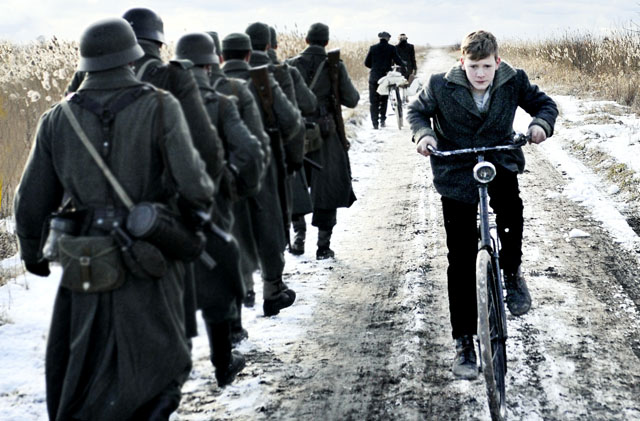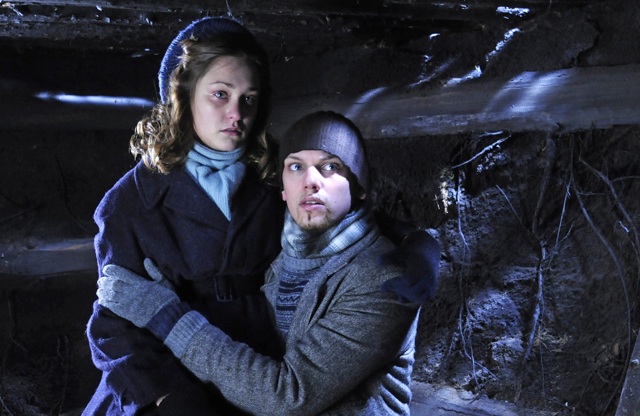CHICAGO – In anticipation of the scariest week of the year, HollywoodChicago.com launches its 2024 Movie Gifts series, which will suggest DVDs and collections for holiday giving.
World Conflict is a Boy’s Life For ‘Winter in Wartime’
 Rating: 4.5/5.0 |
CHICAGO – When life collides with history, human beings are often both the perpetrators and the victims. In the excellent film “Winter in Wartime,” a boy grows up quickly when confronted with the realities of that history and life in the last days of World War II.
What happens to a childhood when the serious implications of wartime becomes the wolf at the door is the main premise of the film. There are bound to be secrets, distrust, intrigue and the unfortunate tragedy. The absorbing story has all of this, and is rendered by the sincere performances of a great cast, especially the young boy at the center of the conflict.
That boy is Michiel (Martijn Lakemeier), a 13 year old boy living in a Nazi-occupied Dutch village in the last months of World War II. His father (Raymond Thiry) is the mayor of the town, and appeases the occupiers in essence to ride the war out. This rankles his adolescent son, who despises the German army presence. Tensions arise when Michiel pokes around a crashed British aircraft, but his father intervenes, leaving their relationship even more strained.
There is underground anti-occupier activity in the town, which includes Michiel’s Uncle Ben (Yorick van Wageningen). Through friends, Michiel gets involved with some of that activity, and he ends up with a letter to be delivered to the town’s blacksmith in case of a friend’s arrest. When that arrest occurs, Michiel witnesses the blacksmith being gunned down before he can make the delivery. He decides to read the letter.
 Photo credit: Sony Pictures Classics |
This leads him straight to a hideout of the British officer (Jamie Campbell Bower) who had piloted the crashed plane, and killed a German when he parachuted into the town. He’s injured, and Michiel brings his sister Erica (Melody Klaver), who is a nurse, to care for him. Uncle Ben becomes suspicious, and the Nazis start ripping up the town to find their enemy. Relationships are about to be severely tested between Michiel, his father and his uncle, and the harboring of the pilot has implications for the entire village.
This is pulse pounding storytelling, especially as the Nazis get closer to their prey, and the screenplay (based on a novel by Jan Terlouw) wrings out every near miss and wily escape. There is always something about the state of war during that second global conflict that lends itself to creative narrative. Everybody was involved in the occupied towns, nobody was to be completely trusted, and this thick undercurrent generates a provides a perfect background for this type of storytelling.
The cast is universally excellent, especially the character of the boy played by Martijn Lakemeier. He is truly just a boy throughout the entire situation, but he also lashes out against authority, that is both parental and governmental. He is trying to save the world by saving the pilot, and in the interim crosses that moral line between boy and man. Raymond Thiry, who plays Michiel’s father, is also notable. Father and son have a tender scene where the elder teaches the boy how to shave, and given what might happen at any time during a war, it is played perfectly.
The supporting cast has many emotions to communicate, and most of them have a duplicitous nature about them, whether motivated by the war and even love. The pilot and Michiel’s sister develop a relationship, which adds another layer to the possibilities of the impending escape. Uncle Ben is by turns mysterious and creepy, and while his loyalty is unquestionable on the surface, the performance by Yorick van Wageningen is multi-textured enough to keep us guessing.
The direction, by Martin Koolhoven, is exemplary in communicating the harsh reality of the war’s last days. The villagers were low on food, morale and patience. Unnecessary risks were being taken in order to come to an endgame and all the framing of action has that sword hanging over it. There is an especially fine chase sequence, horses versus motorcycles, that rivals any car or modern equivalent chase.
 Photo credit: Sony Pictures Classics |
The role of winter is sublimely realized. It is the cold darkness before the dawn of the spring’s Victory in Europe Day. If the villagers can reach that goal, that we know is coming, then all will be well. Except it doesn’t exactly end up that way, when family members, friends and heroes are not there to celebrate. Victory can also be hollow.
In approximately three generations since World War II, everything has changed. Conventional war is a chess match, weapons of mass destruction can change any game and technology overcomes our ability to fight it. Winter in Wartime reminds us of a time when the fight had consequences, where a battle won could mollify an entire war.
 | By PATRICK McDONALD |


